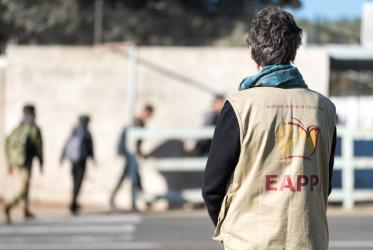By Albin Hillert*
On 15 March, a group of Ecumenical accompaniers from the World Council of Churches (WCC) were invited to share Shabbat dinner with the Kol HaNeshama congregation in Jerusalem.

Ecumenical accompaniers arrive at the synagogue of Kol HaNeshama.
“We believe all people are created in the image of God, and that religion comes after,” said Rabbi Tamara Schagas as she welcomed the group of international participants in the WCC Ecumenical Accompaniment Programme in Palestine and Israel.
Schagas is a member of Kol HaNeshama, a reformed Jewish congregation of 350 families in Jerusalem – one that works actively to be a focal point for Jewish pluralism and social action in the area.

Kol HaNeshama’s congregants originate from Israel and from countries all over the world. While prayers are in Hebrew, prayer books are available with English translation, as well as Hebrew transliteration.

“We are all connected to what happens in Israeli society, and we see that we need to find a common language to speak to each other,” says Schagas, who is also active in Rabbis for Human Rights.
“We welcome you into our community, our house of prayer to share with you who we are and the work that we do," she said to the accompaniers.
A moment to pray, to meet, and to rest together
After an evening prayer service together in the synagogue, ecumenical accompaniers joined Kol HaNeshama congregants to share a Shabbat dinner.

Rabbi Tamara Schagas recites the Kiddush, the blessing over the wine, to sanctify the Shabbat.
“On Shabbat, our prayers express thankfulness over the week that has passed, Schagas said. “We invite you to come and meet with us, and to rest with us.”

Pouring water three times over their hands, ecumenical accompaniers participated in the traditional Shabbat custom of N’tilat Yadayim, hand-washing before blessing the meal.

Rabbi Schagas then sprinkled salt over the Shabbat bread, as a symbol of remembrance of the sacrifices that were once part of the Shabbat ritual.

“Being at this Shabbat dinner was balm for my soul,” said one of the ecumenical accompaniers coming out of the synagogue. “We spoke to an Israeli woman who was so wholeheartedly committed to the well-being of the Palestinians, and by that, of the Palestinians and the Israelis.”
“She’s learning Arabic, she teaches Hebrew to Arabic nurses in East Jerusalem,” she continued. “I think what it was, was that there weren’t any ifs or buts, there weren’t any limits on what the Palestinians needed to do to be acceptable, it was that this is what she needed to do to live in this country.”
“The dinner was really interesting,” said another ecumenical accompanier, from Argentina. Seeing how a large part of the accompaniers’ time is spent in placements across the West Bank, she reflected, “it is a big change, and a hard change, to try to understand and focus on an Israeli point of view. I had to sit and really listen, and keep an open mind, and it wasn’t easy. But also, I think it helps you to understand much more. We are a programme to accompany both sides, the Israeli and the Palestinian people.”

With parents originally from Poland, Israel-born Amos was one of the congregants receiving the ecumenical accompaniers at the dinner, affording them an opportunity to learn about Israeli perspectives on the conflict, to share reflections and exchange experiences.
“This was one of the highlights. We’re sitting at a table with a psychiatrist and his wife who works in a bilingual Arab-Jewish school, and they are very politically active in a non-governmental organization working with Holocaust survivors… and we had a very lively discussion,” reflects an ecumenical accompanier from Germany.
“Being in the Palestinian territories… dealing only with settlers and with soldiers will give you a very monolithic image of Israeli society, so I think it’s very necessary to humanize the other side as well,” he adds. “If you are active on only one side, there will be a tendency to dehumanize the other side. But there are many people on both sides who are very helpful in our fight for human rights.”
“We need to be aware of this, and dehumanizing people on any side won’t bring peace closer,” he concludes.
Ecumenical Accompaniment Programme in Palestine and Israel
Rabbis walk through Hebron in solidarity (WCC press release of 7 February 2019)
WCC-EAPPI nurtures partnerships for just peace (WCC press release of 3 January 2019)
‘Not a page in a book’ – accompaniers hear Palestinians’ testimonies from Ma’alul village (WCC press release of 27 March 2019)
EAs offer protective presence, night as well as day, as Khan al Ahmar faces demolition threat (WCC feature of 4 October 2018)
Morning life and resilience under occupation – EAs witness checkpoints in Jerusalem and the West Bank (WCC feature of 9 October 2018)
Early morning business: EAs accompany Bedouin shepherds in Jordan Valley (WCC feature of 7 October 2018)
*Albin Hillert is communication officer for the World Council of Churches.







